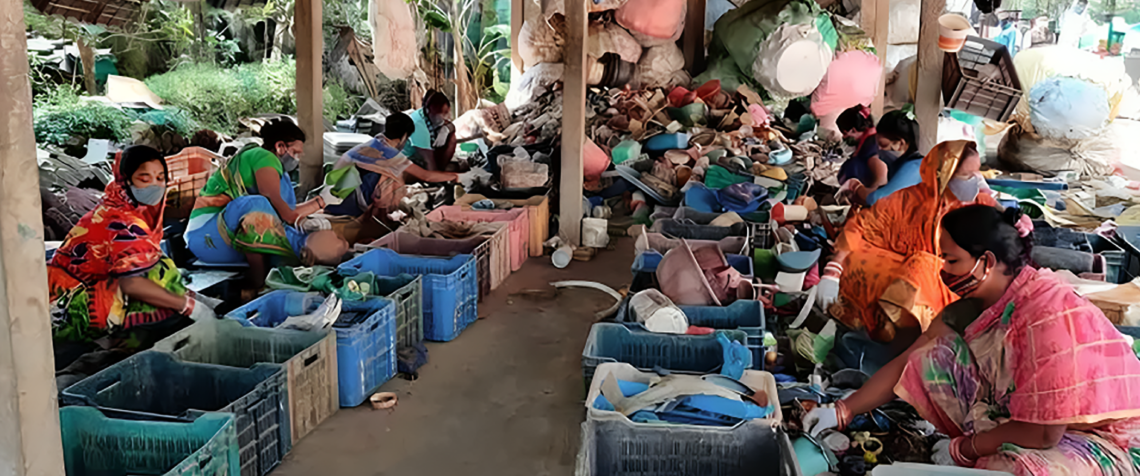India’s e-commerce market is expected to reach $350 billion by 2030, growing at a CAGR of 23%. Now the founder of the country’s first e-commerce company,Abhay Deshpande, a serial entrepreneur who also founded Martjack, India’s first SaaS company, and four partners are building the market for what they believe is the Next Big Thing: waste commerce.
Recykal, a Hyderabad-based company is the operator of the country’s biggest B2B digital marketplace. The platform’s matching engine maps parameters such as material quality, quantity and frequency from listings coming from nationwide buyers and sellers, with the aim of creating an optimal match in sectors such as plastic, paper waste, electronics, and metals. The vision is to build a self-sustaining circular economy in India.
A circular economy is a regenerative approach to production and consumption, in which products and materials are redesigned, recovered, and reused to reduce environmental impacts. Research shows that the transition to a circular economy could generate $4.5 trillion in additional economic output globally by 2030 but progress has been slow. According to the Circularity Gap Report 2022, of the 100 billion tons of materials which enter the global economy every year, only 8.6% are cycled back into the economy. This leaves a massive circularity gap of over 91% which needs to be addressed with concrete action.
Recykal, a World Economic Forum Tech Pioneer, and a member of its UpLink open innovation platform, is making inroads with a made-for-India business model. The country produces 65 million tons of waste every year, which is estimated to go up to 165 million tons by 2030 and 436 million tons by 2050. Currently some four million sellers make a living from waste streams in India but much of it takes place informally, in the offline world. “We saw an opportunity, through the use of technology, to introduce transparency, traceability and compliance,” says Chief Strategy Officer Anirudha Jalan, a former investment banker at Morgan Stanley.
“The sellers are fragmented so we act as aggregators of waste,” explains Jalan. “What we try to solve for in the marketplace is consistency of supply and quality of supply for corporate buyers like Tata or Reliance while solving for transparency and traceability.”
In the seven years since launch the company has gone from 25 to 400 employees and has raised $35 million so far from Morgan Stanley and Circular Capital, among others. The company generated $95 million in revenues in fiscal year 2023. Its waste marketplace now includes some 400 brands, including companies like Johnson & Johnson, Unilever, Coca-Cola and Pepsico India, 500+ recyclers and co-processors and 3000+ service providers and aggregators. An estimated 0.8 million metric tons of repurposed waste material will be channeled through the company in 2024. Recykal was named the nineth fastest growing company in India by Deloitte and the Most Innovative Company in Asia in 2023 by Fast Company magazine.
It is just getting started, says Jalan. Recykal is currently enabling the repurposing of 1% of India’s waste. The ambition is to increase that to number to at least 10%.
“The biggest barrier to scaling is that 95% of recycling today is in the informal sector and the working conditions are less than clean,” says Jalan. “Child labor is employed and transactions made with cash lack traceability and often use unscientific means of segregation and disposal.” But there is growing momentum to create a formal economy, he says.
Clean India, Green India
During the first two years, the founders focused on learning and understanding the waste management domain, first targeting consumers and then moving to a B2B model. From the beginning Recykal benefited from tailwinds generated by “Swachh Bharat”, tougher government regulatory rules that has introduced Extended Produced Responsibility (EPR) and deposit schemes “It is a big movement,” says Jalan. “Almost $20 billion of capital is flowing into sustainability and the green economy.”
Unlike in the West, where people consume and discard, Indians are hard-wired not to throw things away because they are taught that there is value in waste. Even if many people are unfamiliar with the term “circular economy” they have in many respects always participated in one. “This is an economy with so much poverty and such tremendous need,” says Jalan. “Nothing is wasted. Everything has a value.” Still, Indian Prime Minister Narendra Modi understood that behavioral changes were necessary, both at the individual level and in business operations, he says. Governmental measures hav accelerated those behavioral changes, helping Recyckal scale its business.
India enacted a law in 2012 mandating EPR for products such as electronic waste, tires, and batteries. The law makes companies responsible for the collection, processing and recycling of their used products or packaging. The passage of the law meant that major corporations could no longer go to the informal sector to get certificates, which often amounted to an accounting exercise rather than an actual repurposing of material. Now they need to go to a formal recycler. “This has led to a phenomenal mushrooming of recycling in the country and a need for traceability,” says Jalan. In 2016, plastic waste manufacturers also had to comply with the law, impacting many more big brands.
The rules of EPR are continuing to evolve, further boosting the circular economy, says Jalan. Today companies that operate in India are required to recycle 100% of what they produce. Starting next year 30% of many new products made in India will have to be made from recycled materials.
Measures are also being tested to get consumers more involved. In 2022 the District of Rudraprayag in the Indian state of Uttarakhand deployed Recyckal’s digital Deposit Refund System to incentive recycling at the consumer level. Recyckal is the partner of the project and continues to build on the success of its pilot in Kedarnath, a pilgrimage center located in an eco-sensitive program in northern India. During the pilgrimage season, anyone who bought a water bottle on the route had to pay a 10-rupee deposit. After consuming the water, they were required to return the bottles to a collection point along the route. The scheme worked. Consumers returned around 100,000 bottles in a three-month period. This project earned Recykal the digital India award from the President of India. This year the project will be scaled up to three more pilgrimage sites in the Himalayan region: Gangotri, Yamunotri, and Badrinath.
Because the bottles are returned directly, instead of being thrown in the trash, they are cleaner and have a higher value – as much as 40% more.
“If you are going to use waste as a feedstock, the prerequisite is high quality and the only way that can work at scale is with consumer participation, says Jalan.
The company plans to keep trying new ways to use technology to make waste commerce more efficient. For example, it has been testing the use of computer vision technology to collect data on what type of waste is on conveyer belts in recycling centers. “By scanning the shape, size, and volume we can learn, for example, that 35% of consumers in a particular neighborhood consume Coke. This helps us plan what might be hot spots for certain products,” says Jalan. “It is very early days, but we are working with the government on various ideas. The plan is to keep piloting new approaches.”
Recykal is already eyeing other Asian markets. “The model we have created is applicable to emerging markets, like the Philippines, Thailand, Indonesia and Sri Lanka, where there is a large informal waste sector, a large waste picking community and consumers are not willing to pay for collection service,” says Jalan.
Accelerating Progress
So where does that leave the developed world? Corporates should be doing more to promote a circular economy, says Bain & Company, in a brief called Strategy in a Circular World. In a survey of 400 large businesses, 55% said they have made commitments to circularity, but Bain found that “a linear mindset is preventing them from truly embedding it into their businesses.” Bain’s research shows that more than half of the circular initiatives businesses pursue are narrowly confined to recycling or waste management strategies, rather than embracing the full suite of technologies and business models needed for a circular economy—include re-engineering products to last longer, embracing repairability, adopting leasing models, reducing virgin material use, and providing complimentary services throughout the lifecycle of a product.
Sudhanshu Rai, Ph.D, an associate professor of innovation in emerging economies at the Copenhagen Business School who regularly brings students to India to observe Recykal, says businesses in the developed work are plagued by “ poverty of creativity” when it comes to the circular economy.
“Creativity should not stop after a sale is made,” he says. “We need to extend creativity to the full life cycle of a product, from the thread to the sweater and back to the thread.”
That philosophy is embedded in India’s culture and is now being reinforced there by government policy and Recykal’s technology and business model, bringing India, and the world, a little closer to a circular economy.
This article is content that would normally only be available to subscribers. Sign up for a four-week free trial to see what you have been missing.
To access more of The Innovator’s Profits With A Purpose articles click here.







